#Barbara Mary Quant
Explore tagged Tumblr posts
Text
13 aprile … ricordiamo …
13 aprile … ricordiamo … #semprevivineiricordi #nomidaricordare #personaggiimportanti #perfettamentechic
2023: Mary Quant, Barbara Mary Quant, stilista britannica. (n. 1930) 2022: Wang Yumei, attrice cinese. In occasione del centenario della nascita dell’industria cinematografica in Cina nel 2005, la China Film Performance Art Academy l’ha inserita nella lista dei “100 migliori attori in 100 anni di cinema cinese”. È celebre per aver partecipato a Tan Si Tong (1984), Gao shan xia de hua huan (1984)…
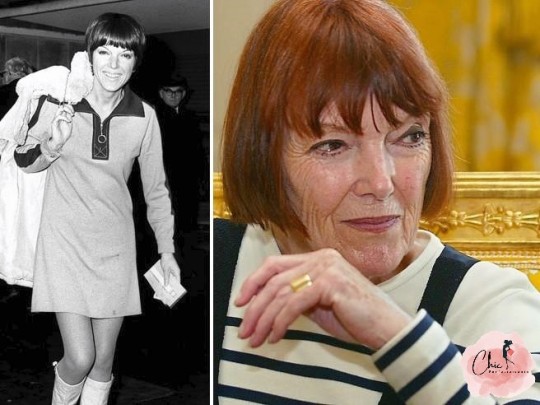
View On WordPress
#13 aprile#Alessandro Guido Baroni#Alex Baroni#Barbara Mary Quant#De Filippo Pasquale#Dorothy Dalton#Emilio Locurcio#Harold Bradley#Harold Willard Bradley Jr.#Larry Parks#Mary Quant#Michel Bouquet#Nicola Trussardi#Patricia Millardet#Ricordiamo#Samuel Klusman Lawrence Parks#Veit Harlan#Wang Yumei
0 notes
Text
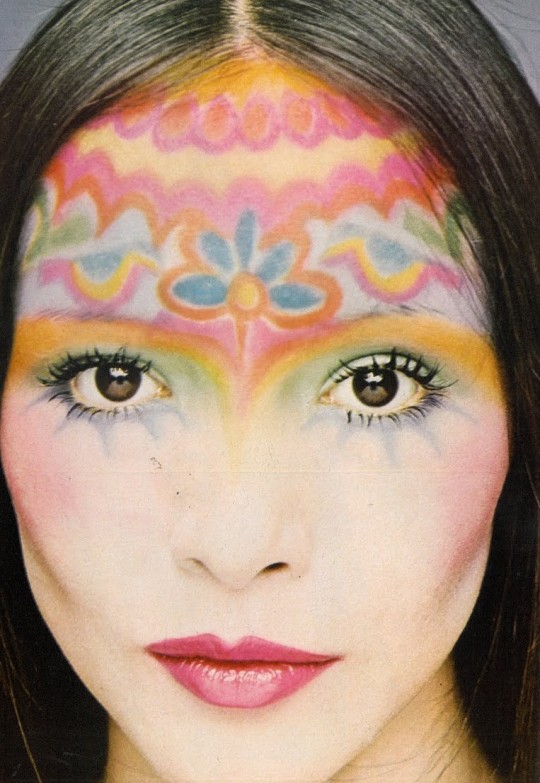
David Steward - Barbara Carrera for Mary Quant (Vogue UK 1971)
#david steward#barbara carrera#vogue#photography#fashion photography#vintage fashion#vintage style#vintage#retro#aesthetic#beauty#70s#70s fashion#70s style#70s model#1970s#1970s fashion#editorial#vogue uk#mary quant
287 notes
·
View notes
Video
Happening Londoners, 1965 by totallymystified Via Flickr: From the Weekend Telegraph magazine, April 1965. Photograph by Horst Munzig.
#Horst Munzig#photographer#retro#vintage#nostalgia#1960s#sixties#jan Blake#Maureen Cleave#Gerald Scarfe#John Michael#Barbara Hulanicki#David Bailey#Pauline Fordham#Peter Blake#Celia Hammond#David Hockney#Rose Evansky#Susan Murray#Mary Quant#Kasmin#Caroline Charles#Susan Hampshire#Paul Clark#Sunday Telegraph#magazine#flickr
1 note
·
View note
Text

PART 11: THE TOTAL LOOK
The Total Look in the Sixties was associated with outfits predominantly of one colour and a big advocate of it was Mary Quant. Here the dress, accessories and shoes are all a similar shade of red. Barbara wears... Hair: Charleston Hairstyle – birksche's simsblog (wordpress.com) Eyelashes: Kijiko 3D Lashes | Kijiko (kijiko-catfood.com Eyeshadow: The Sims Resource - Simxties Eyeshadow Eyeliner: Base game Blusher: Swingin' Sixties Makeup | Patreon Lipstick: Swingin' Sixties Makeup | Patreon Dress: The Sims Resource - Retro ReBOOT Dress - R3 Tights: Get To Work Shoes: Vintage Glamor The Room... Carpet: Dine Out Wallpaper: Wait and see : Groovy times (tumblr.com) Table: Retro Vibes (CC Pack for The Sims 4) - Sixam CC Record player: Retro Vibes (CC Pack for The Sims 4) - Sixam CC Vinyl records: Retro Vibes (CC Pack for The Sims 4) - Sixam CC
15 notes
·
View notes
Text










R.I.P. Dame Barbara Mary Quant. February, 11, 1930 - April, 13, 2023
28 notes
·
View notes
Text
Deaths In 2023
January
1: Fred White (67, American drummer, Earth Wind & Fire)
3: Alan Rankine (64, Scottish musician/producer, The Associates)
6: Gianluca Vialli (58, Italian football player/manager)
10: Jeff Beck (78, English guitarist, The Yardbirds/The Jeff Beck Group/Beck Bogart & Appice)
11: Yukihiro Takahashi (70, Japanese singer/drummer, Yellow Magic Orchestra)
12: Robbie Bachman (69, Canadian drummer, Bachman Turner Overdrive)
Lisa-Marie Presley (54, American singer/songwriter, daughter of Elvis, mother of Riley Keough)
16: Gina Lollobrigida (95, Italian actress)
18: David Crosby (81, American singer/songwriter, The Byrds, Crosby Stills Nash & Young)
27: Sylvia Sims (89, English actress, ‘Ice Cold In Alex’)
28: Barrett Strong (81, American singer/songwriter, co-wrote ‘I Heard It Through The Grapevine’/‘Papa Was A Rollin’ Stone’
Tom Verlaine (73, American musician/songwriter/producer, Television)
Lisa Loring (64, American actress, ‘The Addams Family’)
February
2: Calton Coffie (68, Jamaican singer, Inner Circle)
3: Paco Rabanne (88, Spanish fashion designer)
8: Burt Bacharach (94, American songwriter, co-wrote ‘Walk On By’/‘Anyone Who Had A Heart’/‘A House Is Not A Home’/‘Raindrops Keep Falling On My Head’)
10: Hugh Hudson (86, film director, ‘Chariots Of Fire’)
12: David Jolicoeur a.k.a. Trugoy The Dove (54, American rapper, De La Soul)
15: Raquel Welch (82, American actress)
16: Chuck Jackson (85, American soul singer, ‘Any Day Now’/‘I Keep Forgettin’’)
18: Barbara Bosson (83, American actress, ‘Hill Street Blues’)
19: Richard Belzer (78, American actor, ‘Homicide: Life On The Street’/’Law And Order: Special Victims Unit’)
Dickie Davies (94, British television personality, ‘World Of Sport’)
23: John Motson (77, English football commentator, ‘Match Of The Day’)
March
2: Steve Mackey (56, English bassist/producer, Pulp)
Wayne Shorter (89, American jazz saxophonist, Weather Report)
3: Carlos Garnett (84, Panamanian jazz saxophonist)
Tom Sizemore (61, American actor, ‘Saving Private Ryan’)
5: Gary Rossington (71, American guitarist, Lynyrd Skynyrd)
8: Topol (87, Israeli actor, ‘Fiddler On The Roof’/’Flash Gordon’)
10: Junior English (71, Jamaican reggae singer)
12: Dick Fosbury (76, American high jumper)
13: Jim Gordon (77, American drummer, Traffic/Derek & The Dominoes)
14: Bobby Caldwell (71, American singer/songwriter)
15: Greg Perry (singer/songwriter/producer)
16: Fuzzy Haskins (81, American singer, Parliament/Funkadelic)
17: Lance Reddick (60, American actor, ‘The Wire’/’Oz’/’John Wick’ films)
23: Keith Reid (76, English songwriter, Procol Harum)
Peter Shelley (80, English singer/songwriter/producer, ‘Gee Baby’/’Love Me Love My Dog’)
28: Paul O’Grady a.k.a. Lily Savage (67, English comedian)
Ryuichi Sakamoto (71, Japanese musician/composer, Yellow Magic Orchestra, composed theme to ‘Merry Christmas, Mr. Lawrence’)
29: Charles Sherrell a.k.a. Sweet Charles (80, American bass player/singer, The JBs, ‘Yes, It’s You’)
April
5: Booker T. Newberry III (67, American singer, Sweet Thunder, ‘Love Town’)
6: Paul Cattermole (46, English singer, S Club 7)
8: Michael Lerner (81, American actor, ‘Barton Fink’)
12: Jah Shaka (75, Jamaican sound system operator)
13: Dame Mary Quant (93, English fashion designer)
14: Mark Sheehan (46, Irish guitarist, The Script)
16: Ahmad Jamal (92, jazz pianist)
17: Ivan Conti (76, jazz drummer, Azymuth)
22: Barry Humphries a.k.a. Dame Edna Everage (89, Australian comedian/actor)
Len Goodman (78, English TV personality)
25: Harry Belafonte (95, American musician/actor/civil rights leader)
27: Wee Willie Harris (90, English rock & roll singer)
Jerry Springer (79, English-born, American TV host)
28: Tim Bachman (71, Canadian guitarist, Bachman-Turner Overdrive)
May
1: Gordon Lightfoot (84, Canadian singer/songwriter, ‘If You Could Read My Mind’)
3: Linda Lewis (72, English singer/songwriter, ‘Rock-A-Doodle-Doo’)
18: Jim Brown (87, American football player/actor, ‘The Dirty Dozen’)
19: Pete Brown (82, poet/singer/lyricist, ‘Sunshine Of Your Love’/’White Room’/’I Feel Free’)
Andy Rourke (59, English bass player, The Smiths)
24: Bill Lee (94, American jazz musician/composer, Spike’s dad, scored ‘She’s Gotta Have It’/‘School Daze’/’Do The Right Thing’
Tina Turner (84, American-born, Swiss singer/actress, ‘River Deep Mountain High’/’Nutbush City Limits’/’What’s Love Got To Do With It?’)
26: Reuben Wilson (88, American jazz organist, ‘Got To Get Your Own’)
June
1: Cynthia Weil (82, songwriter, ‘You’ve Lost That Lovin’ Feelin’’/’Here You Come Again’)
6: Tony McPhee (79, English guitarist, The Groundhogs)
12: Treat Williams (71, American actor, ‘Hair’/’Prince Of The City’)
14: John Hollins (76, English football player, Chelsea/Arsenal/England)
15: Glenda Jackson (87, English MP/actress, ‘Women In Love’/’Sunday Bloody Sunday’)
27: Julian Sands (65, English actor, ‘A Room With A View’)
29: Alan Arkin (89, American actor, ‘Catch 22’/’Little Miss Sunshine’)
30: Lord Creator (87, Trinidad-born, Jamaican singer/songwriter, ‘Kingston Town’)
July
3: Vicki Anderson a.k.a. Myra Barnes (83, American soul singer, Carleen’s mum)
Mo Foster (78, English songwriter/musician/producer)
5: George Tickner (76, American guitarist, Journey)
16: Jane Birkin (76, French/English actress/singer, ‘Je t’aime … moi non plus’, banned by the BBC in 1969)
21: Tony Bennett (96, American singer, ‘I Left My Heart In San Francisco’)
22: Vince Hill (89, English singer, ‘Edelweiss’)
24: Trevor Francis (69, English football player, Birmingham City/England)
26: Randy Meisner (77, musician/songwriter, Poco/The Eagles, ‘Take It To The Limit’)
Sinead O’Connor (56, Irish singer, ‘Nothing Compares 2 U’/songwriter, ‘Mandinka’)
30: Paul Reubens a.k.a. Pee-Wee Herman (70, American actor/comedian)
31: Angus Cloud (25, American actor, ‘Euphoria’)
August
4: John Gosling (75, English keyboard player, The Kinks)
7: DJ Casper (58, DJ/artist/songwriter, ‘Cha Cha Slide’)
William Friedkin (87, American film director, ‘The French Connection’/’The Exorcist’)
9: Robbie Robertson (80, Canadian musician/songwriter/singer, The Band)
Sixto Rodriguez (81, American singer/songwriter, subject of 2012 documentary ‘Searching For Sugar Man’
13: Clarence Avant (92, owner of Sussex Records/Tabu Records, film producer, ‘Jason’s Lyric’)
Magoo (50, American rapper, Timbaland & Magoo)
16: Jerry Moss (88, music executive, the ‘M’ in A&M Records)
17: Bobby Eli (77, guitarist, MFSB/songwriter, ‘Love Won’t Let Me Wait’)
Gary Young (70, American drummer, Pavement)
19: Ron Cephas Jones (66, American actor, ‘This Is Us’)
24: Bernie Marsden (72, English guitarist, Whitesnake/songwriter, ‘Here I Go Again’/’Fool For Your Loving’)
29: Jamie Crick (57, English radio broadcaster, Jazz FM)
31: Gayle Hunnicutt (80, American actress, ‘Dallas’)
September
1: Jimmy Buffett (76, American singer/songwriter, ‘Margaritaville’)
4: Gary Wright (80, American singer/songwriter, ‘Dream Weaver’/’Love Is Alive’)
Steve Harwell (56, American singer/rapper, Smash Mouth)
8: Mike Yarwood (82, English comedian/impressionist)
13: Roger Whittaker (87, Kenyan-born English singer/songwriter, ‘Durham Town’)
16: Sir Horace Ove (86, Trinidadian-born, English film director, ‘Pressure’)
Irish Grinstead (43, American R&B singer, 702)
25: David McCallum (90, Scottish actor, ‘The Man From U.N.C.L.E.’/’N.C.I.S.’/musician)
28: Michael Gambon (82, English actor, ‘Harry Potter’ movies)
30: Russell Batiste Jr. (57, American drummer, The Meters)
October
2: Francis Lee (79, English football player, Manchester City/England)
8: Burt Young (83, American actor, ‘Rocky’)
11: Rudolph Isley (84, American singer, The Isley Brothers/songwriter, ‘That Lady’)
12: Michael Cooper (71, Jamaican musician, Inner Circle/Third World)
14: Piper Laurie (91, American actress, ‘Carrie’/’The Hustler’)
19: DJ Mark The 45 King (62, DJ/musician/producer, ‘The 900 Number’)
20: Haydn Gwynne (66, English actress, ‘Drop The Dead Donkey’)
21: Sir Bobby Charlton (86, English footballer, Manchester United/England)
24: Richard Roundtree (81, American actor, ‘Shaft’)
28: Matthew Perry (54, American-Canadian actor, ‘Friends’)
November
12: Anna Scher (78, founder of the Anna Scher Children’s Theatre)
19: Joss Ackland CBE (95, English actor, ‘White Mischief’)
22: Jean Knight (80, American soul singer, ‘Mr. Big Stuff’)
25: Terry Venables (80, English footballer, Chelsea/Tottenham Hotspur/England manager)
26: Geordie Walker (64, English guitarist, Killing Joke)
29: Sticky Vicky (80, Spanish dancer and illusionist)
30: Shane MacGowan (65, English-born Irish singer, The Pogues/songwriter, ‘Fairytale Of New York’)
December
1: Brigit Forsyth (83, Scottish actress, ‘Whatever Happened To The Likely Lads?’)
5: Denny Laine (79, English musician, The Moody Blues/Wings, songwriter, ‘Mull Of Kintyre’)
7: Benjamin Zephaniah (65, English poet/writer/actor, ‘Peaky Blinders’)
8: Ryan O’Neal (82, American actor, ‘Love Story’/’Barry Lyndon’/’Paper Moon’)
Nidra Beard (71, American singer, Dynasty)
11: Andre Braugher (61, American actor, ‘Homicide: Life On The Street’/’Brooklyn Nine-Nine’/’Glory’)
Richard Kerr (78, English singer/songwriter, ‘Mandy’)
15: Bob Johnson (79, singer/songwriter/musician, Steeleye Span)
16: Colin Burgess (77, Australian drummer, AC/DC)
17: Amp Fiddler (65, singer/songwriter/producer)
2 notes
·
View notes
Photo

✿ Dame Barbara Mary Quant CH DBE FCSD RDI .. 11.ii.1930 – 13.iv.2023 ✿
10 notes
·
View notes
Text
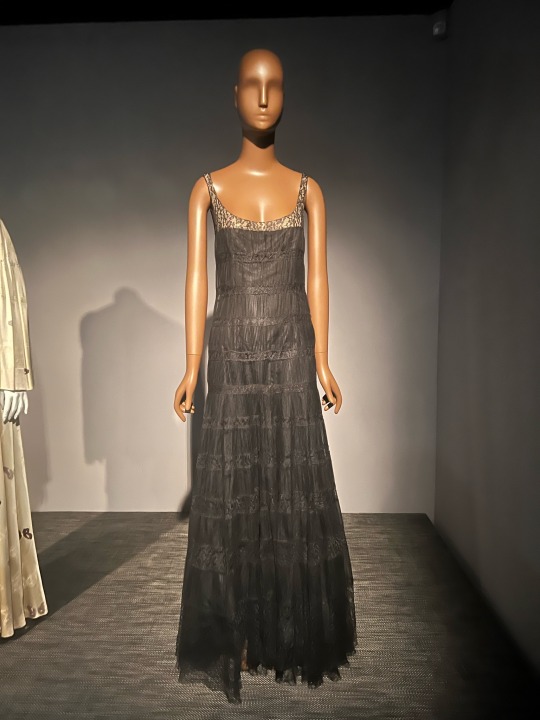

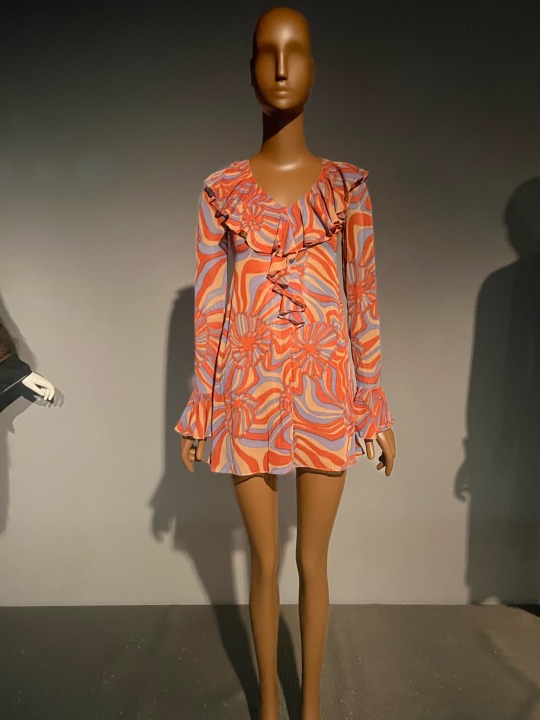
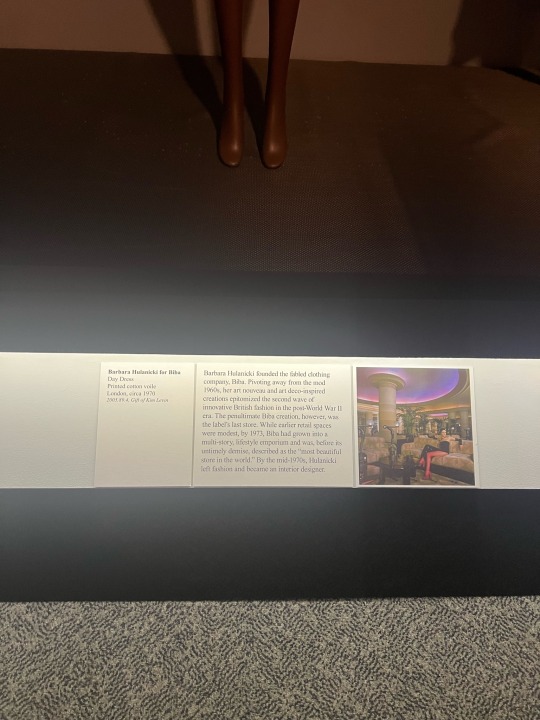
Our trip to the museum was fascinating; I enjoyed seeing the vast difference between the ages of fashion and how pieces evolved into what they are today. For example, the “little black dress” we all know and love; as you can see started as a long black gown with lace detailing on the top and ruffle trims , it was a great way to visualize how women dressed during this age of time and fascinating to see the contrast from then to now. Today the little black dress is a staple in any women's closet. Going onto a similar garment that we can still see today and see different versions of it is this beautiful Schiaparelli Ivory silk satin silk robe dress. This silk robe is just a beautiful statement that resembles the contemporary art of Schiaparelli and a mix of her collectibles from Asia and Europe. We can still see designers using inspiration from their travels from around the world and seeking inspiration from collectibles and sightseeing.
Fast forward to the 70s with Barbara Hulanicki for Bilba and this cotton-printed ensemble that I adore. This mini dress resembles Barbara’s disco-inspired collections; she had a love for disco and her home was filled with pieces that are filled with inspiration. Her power in fashion created the second wave of British fashion post World War II. Personally, the 70s is my favorite era of fashion because it was whimsical, the birth of mini skirts thanks to Mary Quant in the early 70s (late 60). Of course, Studio 54 was a huge influence on 70s fashion, and this day dress you can see here as well Mary Quant painting the way women wear mini skirts you can see it at all in Studio 54. Influences by Cher, Diana Ross, Michael Jackson, and many more.
2 notes
·
View notes
Text





📌 [BILLET] « Il pleut sur Nantes », chantait à tort Barbara.
Car le soleil rayonne dans la capitale de la Bretagne (historique) à chacune des éditions du Festival Nature Nomade qui se tient chaque année à l’automne au muséum de Nantes.
Cette édition 2023 a d’abord été pour moi un tourbillon d’émotions suite à 2 conférences que j’ai données en milieu carcéral. Ce contact avec un « public empêché » a été riche d’enseignements et de réflexions quant à bien entendu aux notions de liberté, d’exploration et d’évasion.
Je remercie chaleureusement Faustine et Benoit, les organisateurs d’avoir pensé à moi ainsi que Blandine P. de la ligue de l’enseignement pour son accompagnement sur le terrain.
Le samedi matin, j’ai ensuite raconté au grand public, face à un amphithéâtre plein, mon aventure et mon récit « L’échappée, une traversée de la France en diagonale et à vélo » paru aux éditions du Trésor (et toujours disponible en librairie)
Ce festival a été également l’occasion de belles rencontres.
Je suis heureux d’avoir ainsi pu croiser les chemins des gens de Lettres comme Clara Arnaud, David Wahl, Alexis Jenni, Cédric Gras, Michel Izard, Marie Détrée Hourrière, Daphné Buiron, Delphine Grouès et tant d’autres.
Mention spéciale à l’explorateur très Vernien Olivier Sauzereau, dont le voyage céleste depuis son jardin, va continuer de profondément me marquer.
Merci encore aux organisateurs du festival « Nature Nomade », un événement piloté avec maestria par Faustine, Benoît et (super) Valérie de LA GEOTHEQUE, ainsi que toute leur équipe de bénévoles.
Vivement l’année prochaine !
« Il pleut sur Nantes / Donne-moi la main / Le ciel de Nantes / Rend mon cœur chagrin / Un matin comme celui-là ».
La chanteuse Barbara a finalement raison.
Saperlipopette !
#naturenomade#nantes#bretagne#culture#livres#sciences#musuemnantes#art#festivallitteraire#littérature#exploration#communicationscience#artetscience#ecologie#poesie#laranceréenchantée#léchappée
1 note
·
View note
Text
Best Facing Risk Statements To Embrace Fearless Decisions

Facing risk ঝুঁকি সম্পর্কে উক্তি is certainly not a simple accomplishment. However frequently the only one empowers us to find our actual potential and accomplish unimaginable outcomes.
Thus, prepare to set out on an excursion of vulnerability and wandering past your usual range of familiarity with my perfect assortment of facing risk statements.
I gathered these shrewd words from different web-based sources to assist you with embracing the adventure of hazard making and stride strikingly into unfamiliar waters.
Best Facing Challenge Statements
"To have faith in yourself is to gamble with yourself, and there won't ever be the point at which that chance is excessively hazardous." ― Craig D. Lounsbrough
"In the event that you are not able to risk the uncommon, you should agree to the standard." — Jim Rohn
"At the point when you face challenges you discover that there will be times when you succeed and there will be times when you come up short, and both are similarly significant." ― Ellen DeGeneres
"To carry on with an existence of greatness, you should face challenges." — Debbie Portage
"Just the people who will risk going excessively far might potentially figure out how far one can go." — T. S. Eliot
"It is by all accounts a law of nature, resolute and inflexible, that the people who won't risk can't win." — John Paul Jones
"The greatest gamble an individual can take is to sit idle." — Robert Kiyosaki
"Risk it, take the plunge. Life generally allows you another opportunity, another go at it. It's vital to face huge challenges." ― Mary Quant
"Face a quantifiable challenge throughout everyday life. Make life an undertaking." ― Rupal Asodaria
"You need to face challenges. We will possibly comprehend the supernatural occurrence of life completely when we permit the startling to occur." ― Paulo Coelho
Moving Statements About Facing Challenges
"No man is deserving at least some respect who isn't prepared consistently to gamble with his prosperity, to take a chance with his body, to put his life in danger in an extraordinary reason." — Theodore Roosevelt
"Risk is the novel way to progress." ― Adria J. Cimino
"I don't have faith in traps. I have faith in facing challenges and not doing likewise two times." — Fellow Laliberte
"You need to risk tumbling to have the option to fly." ― Debasish Mridha
"Opportunity is constantly connected with risk-taking, whether it prompts it or comes from it." ― Nassim Nicholas Taleb
"In the event that there is no gamble, there is no prize." ― Christy Raedeke
"You can gauge a potential open door with the very measuring stick that actions the gamble in question. They go together." — Baron Songbird
"You can't find true success in business without facing challenges. It's actually that straightforward." — Adena Friedman
"Try not to stress over disappointments, stress over the possibilities you miss when you don't for a moment even attempt." — Jack Canfield
"Dangers might make you win, or they will make you learn. Both of the advantages merits trying for." ― Israelmore Ayivor
"As we risk ourselves, we develop. Each new experience is a gamble." — Fran Watson
"At the point when you play it excessively protected, you're facing the greatest challenge of your life. Time is the main abundance we're given." — Barbara Sher
"One default thing of accomplishment is risk, the individuals who face the challenge will get the dish." ― Aabas Sadkani
"In the event that you decide on a protected life, you won't ever understand what it resembles to win." ― Richard Branson
"I can't guarantee that you'll at absolutely no point ever get injured in the future, however I can guarantee you the gamble is worth the effort." ― Rick Riordan
"Most things worth doing accompany their reasonable part of dangers." ― Kirsten Beyer
"The best way to find genuine bliss is to gamble with being totally cut open." — Hurl Palahniuk
"The main thing you lose in facing challenge is dread." — Marion Bekoe
"You must gamble with everything. That is the stuff to be aware, to feel love." — Jessica Mauboy
"Everyone falls flat, it's not a problem. It being human is. Try not to let that prevent you from facing challenges." — Katty Kay
"Risk prompts significance." — Tim Sullivan
"Living in danger is leaping off the precipice and building your wings on the way down." ― Beam Bradbury
"I'm enamored with affection, so I'm continuously facing challenges! I believe it's essential for affection, facing challenges." — Melanie Laurent
"A great many people can do exceptional things on the off chance that they have the certainty or face the challenges. However the vast majority." ― Phillip Adams
"I believe there's no story worth passing on for, however I really do think there are stories worth facing challenges for." — Anthony Shadid
"I really do accept we should take a chance to dream, then, at that point, hazard to plan, and afterward hazard to act." ― David DeNotaris
"There is an alluring thing about facing challenges." — Sonny Mehta
"Incredible deeds are typically fashioned at extraordinary dangers." ― Herodotus
"I have consistently trusted in rethinking myself and facing challenges." — Himesh Reshammiya
"Never let the chances hold you back from doing what you know in your heart you were intended to do." — H. Jackson Brown, Jr.
Empowering Facing Challenge Statements
"Make sure to make a major stride. You can't cross a gorge in two little leaps." — David Lloyd George
"Living with dread prevents us from facing challenges, and in the event that you don't go out on the branch, you're never going to get the best natural product." — Sarah Area
"On the off chance that you don't dare anything, when the day is finished, nothing is everything you will have acquired." ― Neil Gaiman
"Never let the chances hold you back from doing what you know in your heart you were intended to do." — H. Jackson Brown, Jr.
"Anything that you can do or dream you can start it. Strength has virtuoso, power, and enchantment in it." — Goethe
"Perhaps at times facing a challenge is more dangerous not. Now and again all you're ensuring is that things will remain something similar." ― Danny Wallace
"Do one thing each day that panics you." — Eleanor Roosevelt
"Just the people who play win. Just the individuals who chance win. History favors daring people. Fails to remember the bashful. All the other things is editorial." ― Iveta Cherneva
"All that you've at any point needed is on the opposite side of dread." — George Addair
"Risk more than others naturally suspect is protected. Dream more than others suspect is reasonable." ― Howard Schultz
Life Statements About Dangers
"Life is intrinsically dangerous. There is just a single huge gamble you ought to stay away from no matter what, and that is the gamble of sitting idle." — Denis Waitley
"He who isn't adequately valiant to face challenges will not achieve anything throughout everyday life." — Muhammad Ali
"To understand what life is worth you need to gamble with it every so often." — Jean-Paul Sartre
"Try not to be too bashful and nauseous about your activities. All life is an examination. The more examinations you make the better." — Ralph Waldo Emerson
"Gain from botches, yours and others. Try not to allow errors to stop risk-taking! Distinguishing and assessing chances is an essential piece of our life." ― Steven Rosenthal
"There is no power of adoration or feeling that doesn't imply the gamble of devastating hurt. It is an obligation to face this challenge, to cherish and feel without guard or hold." — William S. Burroughs
"You can't go anyplace in existence without facing challenges." — Esme Bianco
"Yet, he'd learned some time in the past that a daily existence lived without gambles basically did not merit living. Life compensated mental fortitude, in any event, when that initial step was taken neck-somewhere down in dread." — Tamera Alexander
"Test quick, flop quick, change quick." — Tom Peters
"I have taken part of endangers throughout everyday life, and I accept that life is tied in with facing challenges." — Ayushmann Khurrana
0 notes
Text
youtube
Dame Barbara Mary Quant CH DBE FCSD RDI (11 February 1930 – 13 April 2023) was a British fashion designer and fashion icon.
0 notes
Photo

Dame Barbara Mary Quant CH DBE FCSD RDI (11 February 1930 – 13 April 2023)
0 notes
Text
In what decade did fashion designer Mary Quant release her Ginger Group collection?

In 1963, Mary Quant launched her Ginger Group collection, which was mass-produced and available in 75 outlets across the UK. The name comes from a political term for a pressure group, using the term ginger as a verb meaning to “pep things up”. Whilst Quant’s clothing was already popular, she wanted to produce modern and edgy clothing for a wider clientele.
Quant’s inspiration for the first Ginger Group collection was American sportswear. Rather than all-in-one dresses, she designed items that could be paired together with different things, thus the wearer could mix their wardrobe up without exceeding their bank balance by buying several outfits. The name of the collection led to an unusual “ginger” colour palette, which involved a range of red and orange tones.
Barbara Mary Quant was born on 11th February 1930 in Blackheath, London. Her early life was marred by food and clothing rationings due to WWII, however, she was determined to become a fashion designer. Her parents, who studied at Cardiff University in order to earn first-class degrees and become teachers, were disappointed with their daughter’s ambitions and encouraged her to think about more conventional career choices for women. As a compromise, Quant attended Goldsmiths College to study illustration with the intention to train as an art teacher. College life introduced Quant to new and exciting people and prospects, resulting in an apprenticeship at 'Erik', a high-end Mayfair milliner.
0 notes
Text
Sketchbook Pages for the project ‘Pop-Up Shop’





On these pages I explored pop-up shops,I looked at ergonomics and locations as well as fashion designers like Mary Quant and Barbara Hulanicki to gain inspiration for my pop-up shop.
I included the front cover page where I sketched the ‘rynek’ other known as the old market buildings in Poland.
To gain even more inspiration for the style of shop i would like to design, I created perspective drawings of the shops local to me.
0 notes
Photo

Mary Quant/Biba make-up & scarves featured in Petticoat magazine 23 December, 1972.
328 notes
·
View notes
Text
The Swinging Sixties
Mary Quant
One of the biggest impacts on modern fashion that started in the 1960s is the introduction of the mini skirt. Originally created by designer Mary Quant, the skirt fell six to seven inches above the knee. Often paired with tights and go-go boots, the mini skirt started a phenomenon that still exists today.

Since the late 1950s, Mary Quant has been creating and manufacturing her own line of clothing. She attended art school. She started her own retail store, "Bazaar," on the Kings Road in 1955 with the assistance of Plunkett-Greene and former lawyer Archie McNair, creating the "Chelsea look" and the "mod" era.

Raunak Lally. (2020). ‘Mary Quant’ exhibition celebrates designer behind Britain’s boldest trends. [Online]. standard.asl.org. Last Updated: 6 January 2020. Available at: https://standard.asl.org/13906/culture/mary-quant-exhibition-celebrates-designer-behind-britains-bol [Accessed 4 january 2023].
She was looking for unique and new clothes for "Bazaar," but she wasn't happy with the selection, so she made the decision that the store would have to stock its shelves with her own creations. The "London Look" came to be defined by knee-high, white, patent plastic, lace-up boots and tight, narrow ribbed sweaters with bright checks and stripes.

pasqualetarantinopiscitelli. (2015). MARY QUANT, SWINGING LONDON LOOK. [Online]. www.pasqualetarantinopiscitelli.com. Last Updated: 21 July 2015. Available at: https://www.pasqualetarantinopiscitelli.com/2015/07/21/mary-quant-swinging-london-look/ [Accessed 4 january 2023].
By 1963, her success had led Bazaar to build a second location in Knightsbridge. Later, she introduced the Ginger Group, a more affordable line created to appeal to a larger customer base.
Along with trendy fashion shows and window displays, she secured her reputation through the production of original clothing, sold in her boutique, with many fun and new clothes advertised in the window, appealing to many young women

Laura Porter. (2019). LAURA’S LONDON: SWINGING LONDON – A LIFESTYLE REVOLUTION – NEW EXHIBITION REVIEW. [Online]. londontopia.net. Last Updated: 22 February 2019. Available at: https://londontopia.net/columns/lauras-london/lauras-london-swinging-london-a-lifestyle-revolution-n [Accessed 4 january 2023].
Barbara Hulanicki (Biba)
In 1964, Barbara Hulanicki founded the first Biba store in a former pharmacy on Abingdon Road. It is the clothing brand that established Sixties fashion. Biba's affordable, fashion-forward clothes made it a favourite among icons like Marianne Faithfull and Twiggy, as well as rock stars, models, and students worldwide.


Hulanicki's talent for designing settings that complemented the romantic, sensuous allure of her garments was what brought the Biba boutiques together. Loud music, fashionable staff, dimly illuminated historical architecture, and disorganised changing rooms created a distinctive environment. Young working women could shop alongside models, singers, and TV stars since the clothing was affordable.
Biba established a model for the "lifestyle" strategy that would sustain British retail achievements in the 1980s and 1990s through a combination of mail order, distinctive branding, and an awareness of its customers' desires.

Prior to the brand's growth in the 1970s, when "large Biba" was introduced in its own department store, two additional boutiques in the Kensington neighbourhood were opened. The High Street Kensington store was one of the first significant lifestyle retailers in the UK, with seven storeys of space. It featured a food court, a furniture section, a book store, home goods, and menswear sections, and it quickly gained notoriety for its opulent, decadent ambiance and expensive décor that drew inspiration from Art Nouveau and Art Deco. (formerly praised as "the most beautiful store in the world" by The Sunday Times) The trademark, on the other hand, was transferred to a third party after the company collapsed in 1975 due to financial issues.

Hulanicki launched a scathing attack on House of Fraser's rendition of the Biba label in an interview with Retail Week sister publication Drapers, claiming that it did not adhere to the original Biba aesthetic and was "too expensive": She said, chuckling, when asked if the department store's updated version of Biba resembled the design of her first line, “No. It looks like House of Fraser. No Comment.”
Art and Fashion
"Poster dresses" by Harry Gordon were inexpensive, enjoyable, and interesting items. Paper dresses were worn just once or twice before being thrown out. As the craze gained popularity, paper dresses started to appeal to a larger demographic and gave low-income ladies the chance to buy affordable clothing that looked exquisite and expensive.

Throwaway clothing conjured us images of an automated, commoditized future where trends changed as quickly as light. Additionally, it highlighted the 1960s' casual sex appeal. Paper dresses were simple to cut to any length one dared, and their flimsy appearance added a significant amount of sensual cachet. The wearers of paper dresses had to be continuously on guard against lighted cigarettes, spilled cocktails, unexpected showers, and other hazards despite the fact that they were treated for fire and water resistance and surprisingly strong.


Pop Art developed into a distinct art movement as a result of the increasing interest in popular culture, thanks to artists like Andy Warhol and Roy Lichtenstein. Their humorous artwork frequently featured commonplace items like dollar notes, comic strips, and coke cans. Marilyn Monroe's face served as another example of a popular topic in pop art.
Thanks to artists like Andy Warhol and Roy Lichtenstein, pop art developed from the public's rising interest in popular culture into a distinct art style. They frequently employed comic strips, dollar bills, and commonplace items as their subjects in their work, which was humorous. Marilyn Monroe was one of several famous celebrities whose features were utilised as topics in pop art.


admin. (2016). Pop Art: dreams and nightmares of 50s’ and 60s’. [Online]. www.fennyblack.eu. Last Updated: 6 January 2016. Available at: http://www.fennyblack.eu/2016/01/06/pop-art-dreams-and-nightmares-of-50s-and-60s/ [Accessed 4 january 2023].
Screen printing of commonplace items with vibrant artwork were a common genre of Warhol art. In contrast to the methods employed by famous painters in the 1960s, he used straightforward procedures to create their artwork (such as the silk screen ess). Because of these approaches, their art could be simply copied or printed. Lork was frequently funny and featured subjects like dollar bills, dollar tins, and comic strips.
The Icons
Jacqueline Kennedy
Jackie, the youngest First Lady in history, was only 33 years old. She added grace and elegance to American society throughout her brief time in the White House. Women's clothing in the early 1960s emulated the styles popularised by Jackie Kennedy. A First Lady had never set such fashion trends before. Women all over the world sought to imitate her stylish yet refined appearance.
Some common elements:
-Pill box hat
-Suits in pastel colors
-Short boxy-style jackets
-Shift dresses
-Oversized sunglasses
-Pearls

Twiggy
Twiggy was the most popular fashion model of the era, she was known for her "pixie look", which included shift dresses, ballet flats, cigarette pants and an extremely cropped haircut.

Rich. (2012). somebodystolemythunder. [Online]. somebodystolemythunder.blogspot.com. Last Updated: 16 November 2012. Available at: https://somebodystolemythunder.blogspot.com/2012/11/a-few-more-pictures-of-twiggy.html [Accessed 4 january 2023].
Jean Rosemary Shriptom
Dubbed the world's first supermodel, The "Shrimp" went from middle-class schoolgirl to one of the most famous face of the 1960s, famed for her relationship with bad boy photographer David Bailey. She made a style sensation when she came to the Victoria Derby race in a shift dress by Colin Rolfe with a thigh high hemline.

Audrey Hepburn
The Hollywood screen goddess was also quite the fashion icon, largely due to her role f the 60s most popular films, Breakfast at Tiffany's (1961) and the muse of Givenchy.

theplace2.ru. (2019). Audrey Hepburn photos. [Online]. www.theplace2.ru. Last Updated: 19 July 2019. Available at: https://www.theplace2.ru/photos/Audrey-Hepburn-md1810/ [Accessed 3 january 2023].
Brigitte Bardot
Embodied the ultimate sex kitten and pin-up girl; she popularised the Bardot neckline (a wide open neck, exposing your shoulders), the bikini, gingham print and the beehive-inspired hairstyle.

Savoir Flair. (2020). How to Recreate Brigitte Bardot’s Iconic Bouffant Hairstyle. [Online]. www.savoirflair.com. Last Updated: 28 May 2020. Available at: https://www.savoirflair.com/beauty/499393/how-to-recreate-brigitte-bardot-hairstyle [Accessed 3 january 2023].
2 notes
·
View notes
